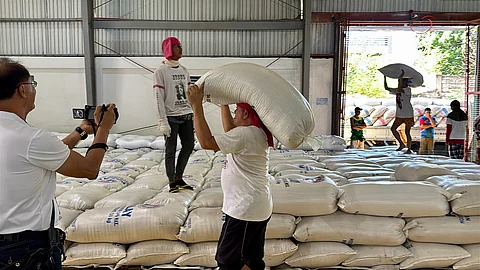
- NEWS
- the EDIT
- COMMENTARY
- BUSINESS
- LIFE
- SHOW
- ACTION
- GLOBAL GOALS
- SNAPS
- DYARYO TIRADA
- MORE

The Department of Agriculture (DA) has earned a rare vote of confidence from the Commission on Audit (COA) after the National Food Authority (NFA), under its supervision, recorded a significant turnaround in rice buffer stock management. The achievement has been hailed as critical to the country’s food security efforts.
In its latest Audit Observation Memorandum (AOM), COA cited the agency for maintaining near-optimal rice inventory levels in 2024, a sharp improvement from past years when the NFA struggled to meet mandated reserves. This progress, auditors noted, helps ensure the country is better equipped to respond to emergencies and natural disasters that threaten food supply stability.
“We commend the management for maintaining the required buffer stock at an almost optimal level, significantly reducing the risk of food insecurity during calamities and emergencies,” the audit stated, signed by COA audit team leader Abdelghani Sultan.
The result reflects the strategic direction set by Agriculture Secretary Francisco P. Tiu Laurel Jr., who also chairs the NFA Council. Along with Administrator Larry Lacson, he led the push to implement reforms aimed at transforming the NFA from a struggling agency into a functional food security arm of government.
“This recognition from COA affirms that the reforms we’re pursuing are working – not just for farmers but for the broader food security goals of the country,” said Secretary Tiu Laurel. “It’s about building a resilient and fair supply chain.”
Key to the improvement was the launch of the Price Range Scheme (PRICERS), a market-responsive buying framework that allows the NFA to adjust its palay procurement prices weekly. The program made NFA buying rates more competitive, ranging from P17 to P30 per kilo, helping the agency attract more farmer-sellers and discouraging price manipulation by traders.
“We’re aggressively procuring palay in areas where prices are low, and once the repairs of 134 warehouses are completed, we’ll have even more capacity to support farmers at fair prices,” Lacson said.
These efforts are also feeding into the Marcos administration’s flagship P20-per-kilo rice program, which the DA plans to sustain until 2028. The DA’s reforms, led by Secretary Tiu Laurel, have moved beyond policy and into grassroots execution. This includes strengthening institutional partnerships through the Ugnayan campaign and PALLGU, expanding mobile procurement, and extending buying hours to reach more farming communities.
Through these initiatives, the NFA achieved 90 percent of its 495,000 metric ton procurement target for 2024, marking one of its strongest performances in years.
